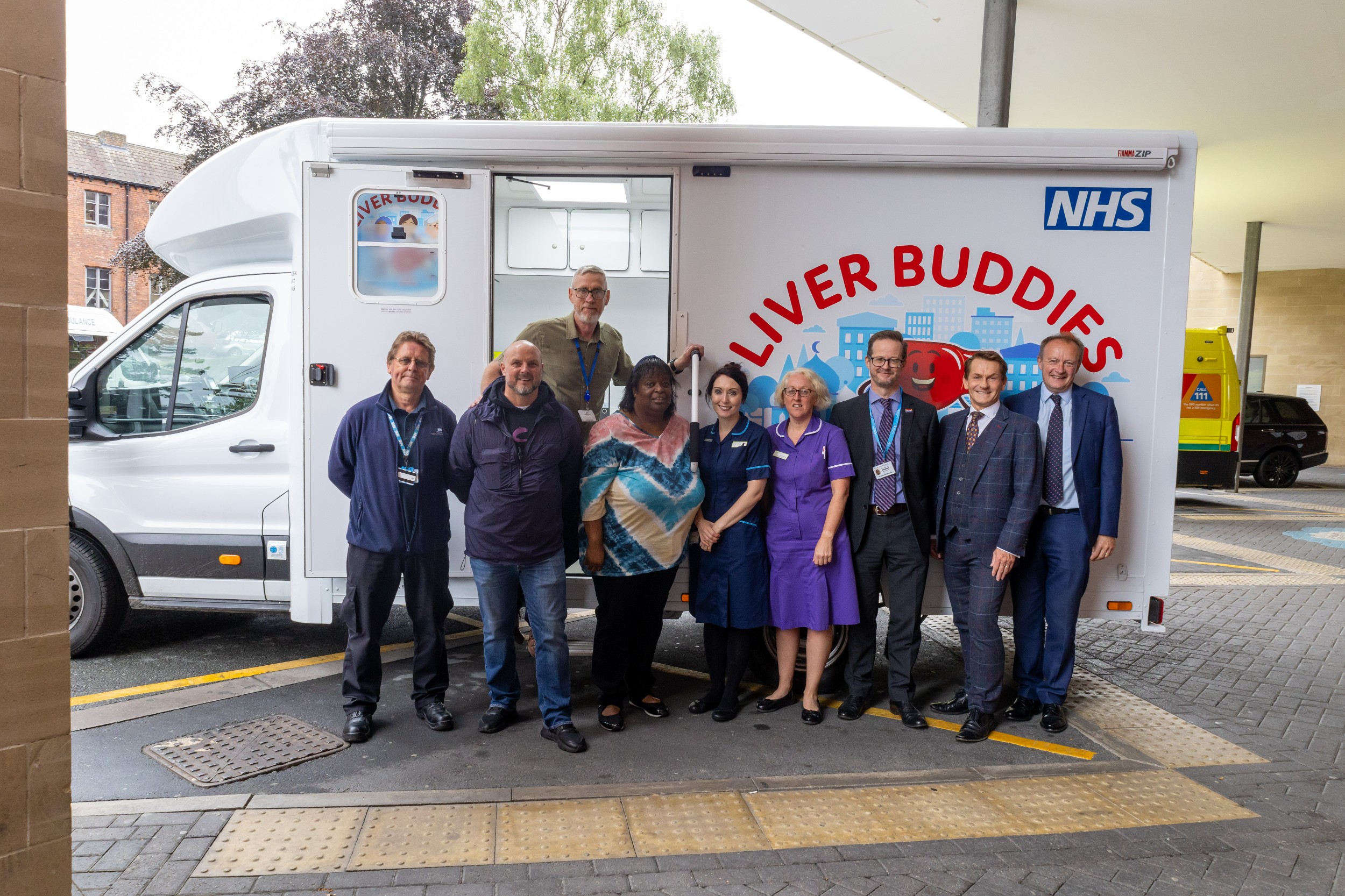Publish date: 10 November 2023
More than 2,200 people in high-risk communities have been newly identified as being at risk of life-threatening liver cancer, thanks to NHS roaming liver units across the country.
Under a major NHS drive to detect more cancers earlier and save more lives, 12 on-the-spot liver scanning units have been touring 18 areas of England, including West Yorkshire.
Many of those scanned, since the scheme launched nationally 15 months ago, have been found to have cirrhosis or advanced fibrosis, putting them at an increased risk of developing liver cancer.
Latest data shows the roaming units have performed more than 26,500 hi-tech fibroscans and identified 2,204 people with cirrhosis or advanced fibrosis,– between June 2022 and September 2023 – with the majority of those individuals referred on to further care.
In West Yorkshire, the new ‘O-Liver’ unit has scanned 180 people, with six being referred for further care since it went live at the end of August 2023. The vehicle is staffed by the ‘Liver Buddies’ who form part of West Yorkshire Liver Care Operational Delivery Network (WYLCODN).
The mobile units are visiting high-risk communities at GP practices, recovery services, food banks, diabetes clinics, sexual health clinics and homeless shelters to perform quick, non-invasive scans.
Checks are being offered in the community to people with a current diagnosis or history of past viral hepatitis, non-alcoholic liver disease and adults with high levels of alcohol consumption; all factors that increase the risk of developing liver cancer.
NHS staff are already visiting at-risk communities as part of the Hepatitis C Elimination Programme; and it was expanded in June 2022 to include a liver health check involving an on-the-spot fibrosis scan which detects liver damage.
Around 6,200 people are diagnosed with liver cancer each year, but the number of cases has doubled over the past decade and is expected to continue to rise.
The initiative in West Yorkshire has been welcomed by Ingrid Ablett-Spence, programme manager for West Yorkshire and Harrogate Cancer Alliance Optimal Pathway Groups.
“As a Cancer Alliance, we are delighted to see O-Liver on the road, helping to bring liver screening to vulnerable people who may not otherwise access these services.
“The evidence shows us that the earlier that cancer is diagnosed, the greater the chance that it is treatable. The role of O-Liver and the Liver Buddies team is therefore a major step forward in tackling the health inequalities faced by these individuals.
“They may not be affected by cancer at the point of coming into contact with liver screening, but rather are at high risk of developing the disease. This latest development means screening and advice will be available much closer to where they are.
“Tackling unacceptable variations in how cancer prevention, care and treatment is provided is a major element of the role of the Cancer Alliance, and we’ve been delighted to support the Operational Delivery Network in this work. Congratulations to the team on turning their vision into reality.”
Professor Peter Johnson, NHS Clinical Director for Cancer, said: “We are seeing liver cancers increasing year on year, but finding them early gives the best chance of successful treatment, which is why we have set up this initiative that is having such a positive impact and making it easier for people who are at a higher risk of liver cancer or other organ damage to get life-saving checks.
“Bringing liver scans into the heart of communities has already helped us find thousands of people with liver damage that needs further monitoring, investigation, or treatment; and in the future, we expect to help tens of thousands more patients receive a diagnosis sooner.
“Lives are saved when cancers are caught early and when more people are referred for tests, which is why the NHS has put so much effort into early diagnosis in recent years, as well as increasing access to testing.”
Currently only one in three liver cancers are diagnosed at an early stage, but this initiative is helping to catch more cancers earlier.. If caught early, patients have a 45% chance of survival for five years or more with treatment, compared to just 5% of those diagnosed at stage 4.
Those scanned and are deemed high risk of liver cancer or cirrhosis will be provided with information about their level of risk and, where appropriate, will be referred to their GP. If needed, patients will be referred straight into a six-month liver surveillance care programme, where they will be partnered with a peer support worker who will continue to check in, as well as offer guidance and help informed by people who have experienced liver disease themselves.
On-the-spot liver scanning initiative is an essential part of the NHS’s ambition of detecting more cancer as early as possible, which will see three in four people have their cancer detected at a very early stage when treatment is more effective. It is helping to identify those at risk of the most common form of liver cancer, hepatocellular carcinoma (HCC), which makes up 85% of all liver cancers.
The initiative means that patients get access to the specialist services they need quickly – regardless of where they live.
Symptoms of liver cancer include unexpected weight loss, loss of appetite, vomiting blood, and pain or swelling of the abdomen. If anyone has symptoms of liver cancer, they should contact their GP straight away.
Ends

